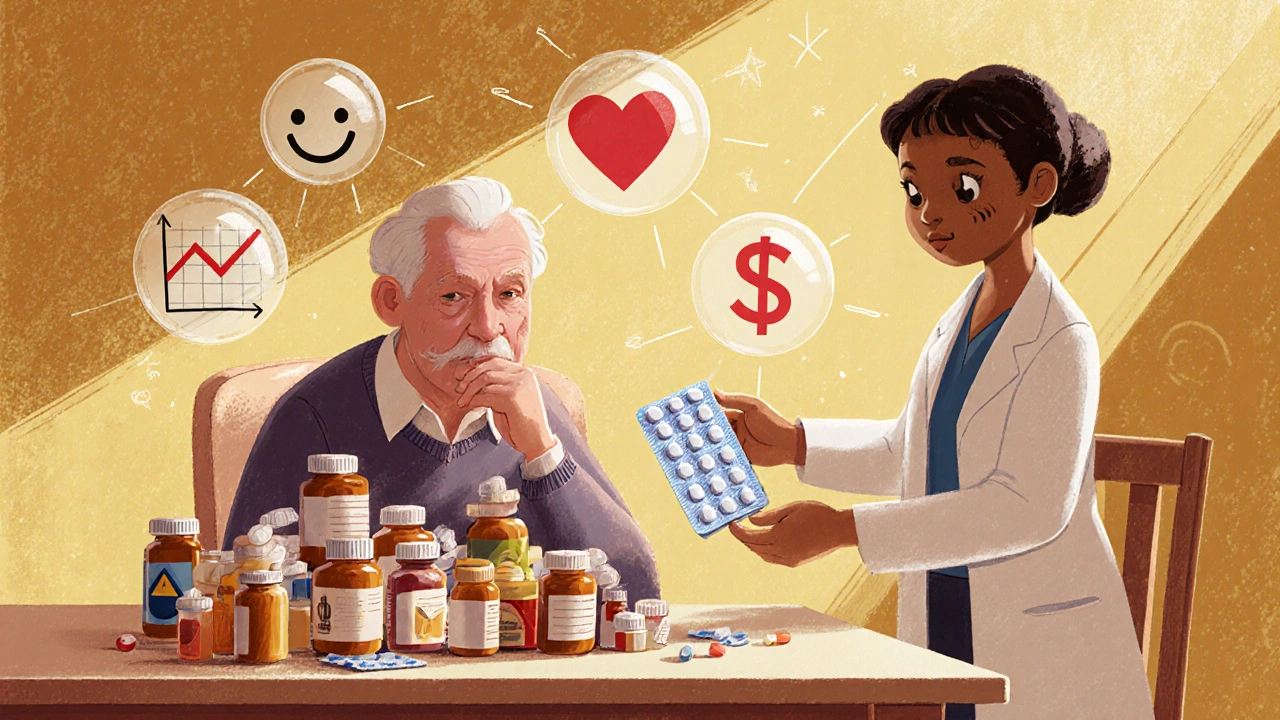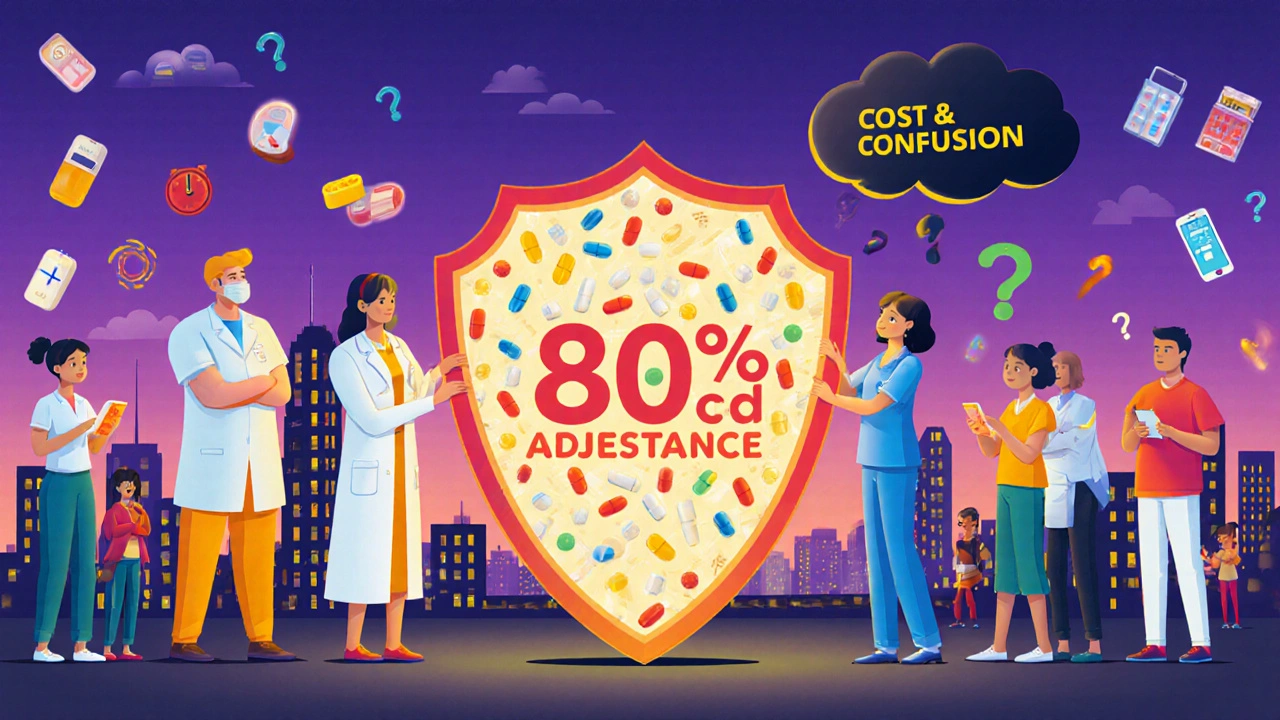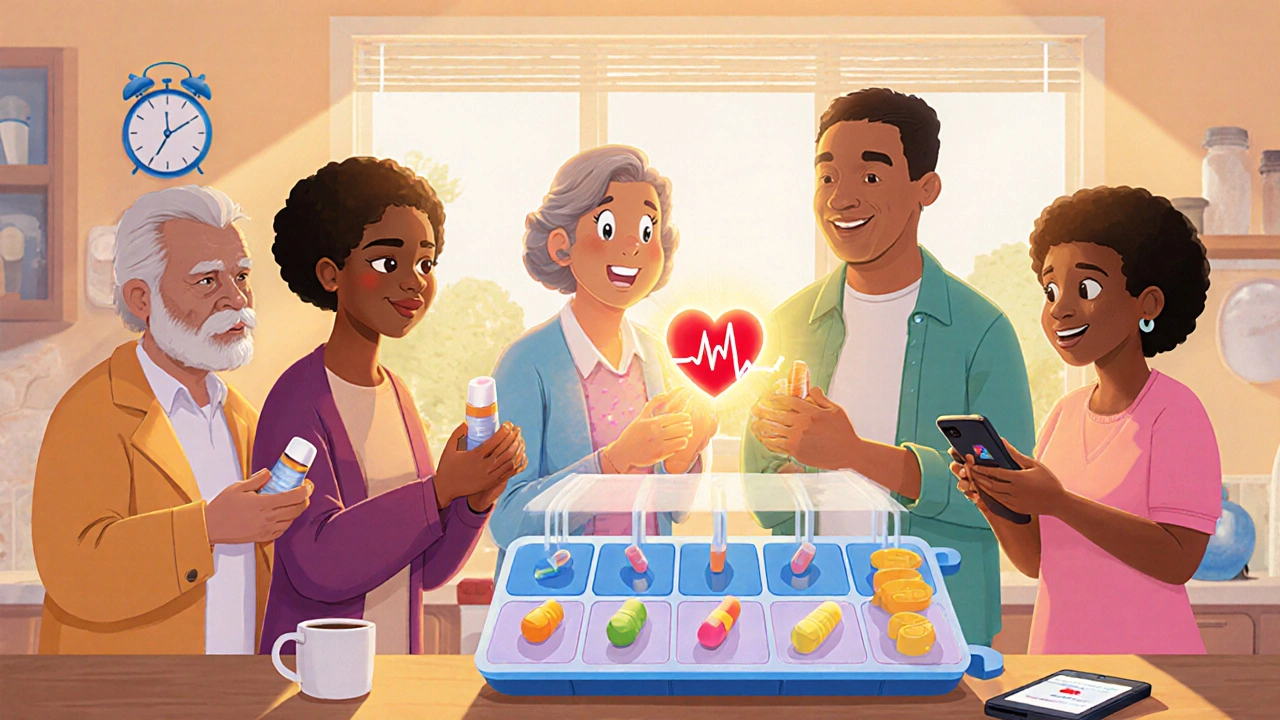Getting your medicine right isn’t just about picking the right drug-it’s about taking it the way your doctor meant you to. Yet, nearly half of all people with chronic conditions miss doses, skip refills, or stop altogether. This isn’t laziness. It’s not ignorance. It’s a system problem. And the cost? Over 125,000 deaths in the U.S. each year, billions in avoidable hospital visits, and treatments that just don’t work because the pills never made it to the right place: your body.
Why People Don’t Take Their Meds
It’s not one thing. It’s a mix. Forgetfulness is the biggest culprit-68% of people say they just lose track. But look deeper. Maybe your pill bottle has six different pills, each with a different time of day. Maybe you’re scared of side effects. Maybe the copay jumped from $10 to $75 and you can’t afford it. Or maybe you feel fine now and think, “Why keep taking this?” There are two kinds of non-adherence: unintentional and intentional. Unintentional means you meant to take it-you just forgot, got confused, or ran out. Intentional means you made a choice. You decided the side effects weren’t worth it. You didn’t believe it worked. You thought your blood pressure was fine now, so you stopped. Both are real. Both need different fixes.How Many Pills Are Too Many?
Every extra pill you have to take each day makes it harder. One pill a day? Around 79% of people stick with it. Four pills a day? That drops to 51%. That’s not a small drop-it’s a cliff. Complex regimens are the silent killer of adherence. Doctors often prescribe multiple meds because they’re treating multiple conditions. But that’s where the system fails. Instead of asking, “Can we simplify this?” they add more. A 2023 study showed that patients on five or more daily medications were 40% more likely to miss doses than those on one or two. If you’re juggling pills for diabetes, high blood pressure, cholesterol, and pain, you’re not just managing health-you’re managing a full-time job.Simple Tools That Actually Work
You don’t need fancy tech to get this right. Start with the basics.- Pill organizers: Weekly or monthly boxes with compartments for morning, afternoon, evening. 73% of people who use them say they’re a game-changer. No more guessing if you took your pill.
- Blister packs: Pharmacies can pre-pack your meds into sealed daily doses. You tear one off per day. No counting. No confusion. Just take what’s there.
- Alarm reminders: Set your phone or smartwatch to buzz at the same time every day. Even a simple alarm works better than nothing. One Reddit user with diabetes said their Medisafe app cut missed doses by 22%.
- Medication list: Keep a written or digital list of every drug, dose, and time. Update it every time your doctor changes something. Bring it to every appointment.

Technology: Helpful or Overhyped?
There are apps, smart pill bottles, and even wearables that track when you open your medicine. The FDA says digital tools are growing fast-35% of adherence solutions now use apps. And they work… if you’re comfortable with tech. Apps like Medisafe, Mango Health, and AdhereCard send reminders, track doses, and even alert your pharmacist if you miss a dose. Studies show they can improve adherence by 12-18%, especially for diabetes and hypertension. But here’s the catch: 57% of people over 65 struggle with smartphone apps. If you’re not tech-savvy, an app might add stress, not relief. Electronic pill bottles that log when they’re opened? They’re 95% accurate. But they cost money, and not all insurers cover them. For older adults or those with limited mobility, a simple alarm or pill box still wins.Cost Is the Hidden Barrier
You can have the best system in the world, but if you can’t afford your meds, it doesn’t matter. One in three non-adherent patients say cost is their biggest problem. That’s not a small number-it’s 61%, according to Kaiser Family Foundation data. Talk to your pharmacist. Ask if there’s a generic version. Ask about patient assistance programs. Many drug makers offer free or low-cost meds if you qualify. Some pharmacies have $4 generic lists. Don’t be embarrassed to say, “I can’t afford this.” Your pharmacist has heard it before-and they’ve seen ways out.How Your Doctor Can Help (And What to Ask)
Your doctor can’t fix adherence if they don’t know it’s broken. Most don’t ask. But you can change that. Start your next visit with this: “I’ve been trying to take my meds like you said, but I’ve had trouble. Can we talk about what’s getting in the way?” Ask for:- A simplified regimen-can any meds be combined or reduced?
- A written or printed list of all your meds, with times and purposes.
- Refills scheduled ahead of time so you don’t run out.
- A referral to a pharmacist for a medication review. Many clinics now have pharmacists on staff just for this.

Team-Based Care: The Secret Weapon
The best outcomes don’t come from one person. They come from a team. In a CDC-backed program, heart failure patients who got help from pharmacists, nurses, and doctors saw adherence jump to 89% after 12 months. How? They got:- Personalized education-not just “take your pill,” but “this pill lowers your fluid, so you won’t feel so short of breath.”
- Follow-up calls from pharmacy technicians-just 15 minutes a week raised adherence by 28%.
- Medication reconciliation-every time they saw a new doctor, their whole list was checked and updated.
What to Do If You’re Struggling
If you’re missing doses, here’s your action plan:- Write it down. For one week, note every time you skip a pill. Don’t judge. Just track.
- Find the pattern. Is it always mornings? After work? When you travel? That’s your trigger.
- Choose one fix. Pick the simplest tool: a pill box, a phone alarm, or a blister pack.
- Ask for help. Tell your pharmacist or doctor: “I need help sticking to this.”
- Check your cost. If it’s too expensive, ask about generics or assistance programs.
It’s Not About Willpower
You’re not failing because you’re weak. You’re not failing because you’re careless. You’re failing because the system didn’t design for real life. Taking five pills at different times, dealing with side effects, worrying about cost, forgetting while juggling work and kids-it’s not easy. Adherence isn’t a personal flaw. It’s a design flaw. And the fix isn’t more reminders. It’s simpler regimens, better communication, lower costs, and support that meets you where you are. The goal isn’t perfection. It’s consistency. Even taking 80% of your pills makes a huge difference. The CDC says that’s the threshold for effectiveness. So if you miss one dose a week but get the rest? You’re doing better than most. Start small. One tool. One conversation. One refill. You don’t need to fix everything today. Just get the next one right.What does it mean to be medication adherent?
Being medication adherent means taking your drugs exactly as your doctor prescribed-right dose, right time, right schedule-for as long as needed. The CDC defines adherence as taking at least 80% of your prescribed doses. It’s not about being perfect; it’s about being consistent enough for the medicine to work.
Why do people stop taking their meds even when they know it’s important?
People stop for many reasons. Some feel fine and think they don’t need it anymore. Others can’t afford the cost. Side effects like dizziness, fatigue, or stomach upset can be worse than the condition they’re treating. Some are overwhelmed by too many pills or complex schedules. And some just forget. It’s rarely about not caring-it’s about not having the right support to make it work.
Can I just skip a dose if I feel fine?
No-not without talking to your doctor first. Many medications, like those for blood pressure, cholesterol, or diabetes, work over time. Skipping doses-even when you feel fine-lets your condition creep back. For example, missing one day of blood pressure meds can spike your numbers for the next 24 hours. What you feel now isn’t always what’s happening inside.
Are pill organizers worth it?
Yes, especially if you take multiple pills daily. Pill organizers reduce confusion and prevent double-dosing or skipping. A 2022 survey found 73% of users said they improved adherence because of them. Use a weekly or monthly one with clear labels. Some pharmacies even pre-fill them for you.
What if I can’t afford my medications?
Talk to your pharmacist. Ask if there’s a generic version. Many drug companies offer free or low-cost programs for people with low income. Some pharmacies have $4 generic lists for common meds like statins or blood pressure drugs. Don’t skip doses because of cost-ask for help first. You’re not alone, and help exists.
How can I remember to take my meds every day?
Link your pills to a daily habit: brush your teeth, eat breakfast, or turn off the lights. Set phone alarms. Use a pill box. Try a free app like Medisafe. Put your meds where you’ll see them-next to your coffee maker or toothbrush. The key is consistency, not complexity. One reliable trigger works better than five alarms.
Can my pharmacist help me with adherence?
Absolutely. Pharmacists are trained to review all your meds-prescription, over-the-counter, and supplements. They can spot interactions, simplify your schedule, help you find lower-cost options, and even set up automatic refills. Many pharmacies offer free medication therapy management (MTM) programs. Ask if yours does.
What if I’m on too many pills?
You’re not alone. Many people on multiple chronic conditions take five or more daily meds. Ask your doctor: “Can any of these be combined or stopped?” Sometimes, newer drugs replace two older ones. Or a condition might be better controlled now, so one med can be lowered. Never stop a pill on your own-but do ask for a full review. Simplifying your regimen is one of the most effective ways to improve adherence.







ive been taking my blood pressure meds for 5 years and i still forget sometimes lol. not because im lazy, but because my brain just switches off when its 8am and i’m half-asleep with coffee in one hand and keys in the other. pill organizer changed everything. now i just grab it and go. no guilt, no drama.
Thank you for writing this. 💙 So many people think adherence is about willpower-but it’s really about design. If we made it easier, people would do it. Simple tools like blister packs and alarms? They’re not ‘for old people.’ They’re for anyone who’s human.
i used to skip my diabetes meds when i felt fine… until i passed out at the grocery store. now i keep my pills next to my toothbrush and set a dumb alarm that plays ‘never gonna give you up.’ it’s embarrassing but it works. also, my pharmacist hooked me up with a $4 generic. life saver.
Cost is the real issue. Not forgetfulness. Not complexity. Cost.
Wow, another article telling people they’re not at fault. Newsflash: people skip meds because they’re dumb or lazy. No one’s forcing them to take pills. Just take them. Stop making excuses.
Let me tell you something, the system is a machine that grinds people into dust. You think your pills are the problem? No. It’s the capitalist hellhole that makes you choose between insulin and rent. This isn’t about ‘adherence.’ It’s about survival. And nobody’s fixing that. They just want you to take your pills while the bills pile up.
Been using Medisafe for a year now. Got my mum on it too-she’s 72 and hates phones, but the alarm sound is like a little bell, and she says it reminds her of her old kitchen timer. Works better than any app notification ever did. Also, my pharmacy does free med reviews now. Just walked in, asked, and they did it in 10 mins. No appointment needed.
Love how this post doesn’t blame people. I used to feel like garbage for missing doses until I realized I was taking 7 different pills at 4 different times. No wonder I forgot. My doc just cut it down to 3-combined two meds, dropped one that wasn’t doing much. I’ve been 95% on track since. It’s not about being perfect. It’s about being supported.
soooooo many people dont get this. its not like you just pop a pill and boom youre cured. like i got a beta blocker for anxiety and a statin for cholesterol and a pill for my thyroid and another for my blood pressure and a vitamin d and a magnesium and a daily aspirin and i swear to god my whole life is just a pharmacy aisle. i use a monthly pill box with big letters and i set 5 alarms and i still mess up sometimes. but the thing is, i dont beat myself up. i just grab the next one. my pharmacist says 80% is good enough. and honestly? that’s the most comforting thing anyone’s ever told me. you dont have to be perfect. you just have to keep trying. and if you cant afford it? ask. seriously. ask. theyve seen it all.
My mom died because she stopped her heart meds to save money. She thought she could skip a few days and be fine. She wasn't alone. This isn't just advice. It's a cry for change. If you can afford your meds, help someone who can't. Share this. Talk to your pharmacist. Ask your doctor to simplify. We can do better. We have to.